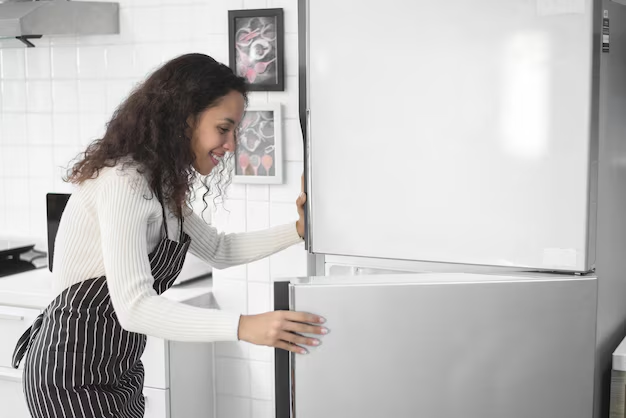Does Your Refrigerator Run All the Time? Here's What You Need to Know!
When it comes to household appliances, the refrigerator stands as one of the most essential components of modern living. Yet, a frequently asked question often arises: does a refrigerator run all the time? Let’s explore this intriguing topic and uncover the mysteries of how refrigerators really work, why they might seem to run continuously, and what this means for your energy bills and appliance longevity.
🌟 Understanding How Refrigerators Work
Basic Functionality: At its core, a refrigerator transfers heat from the inside to the outside. This process is achieved using a refrigerant, a compressor, and a series of coils. By maintaining cool temperatures inside the fridge, food and beverages remain fresh.
Cool Cycles: Contrary to the idea that fridges run all the time, they work on a cyclical basis. The compressor turns on when the internal temperature rises above the set point and shuts off once the desired coolness is achieved. This on-off cycling is key to efficient operation.
Key Factors Affecting Refrigerator Run Time
Door Opening Frequency
Every time the refrigerator door is opened, warm air enters, causing the internal temperature to rise. The fridge will compensate by running more frequently to restore the set temperature. Thus, frequent or prolonged door openings can significantly increase the appliance's run time.
Temperature Settings
Temperatures set too low can cause the compressor to work harder, potentially resulting in more frequent cycling. It's recommended to maintain a fridge temperature between 35-38°F (1.7-3.3°C) to ensure efficiency without overtaxing the system.
Environmental Conditions
The surrounding environment plays a critical role. If a refrigerator is placed in a warm area, the compressor may run longer to combat the ambient temperature. Perennially warm climates or locations near heat sources can influence how long a refrigerator runs.
🔍 Common Misconceptions About Refrigerator Operation
Misconception: Continuous Running Means an Issue
Some might worry that constant running implies a malfunction. In reality, continuous running during hot days or intense kitchen activity is normal. However, if a refrigerator runs without stop for extended periods, it might require a closer look.
Misconception: A Newer Model Shouldn't Run Constantly
Modern refrigerators often have energy-saving modes and other features that can make their operation seem continuous yet efficient. These smart systems adjust operation to balance temperature control with energy conservation.
🛠 When to Investigate Further
While some continuous running is normal, especially during periods of high use or high ambient temperatures, continual operation without pause might indicate a problem:
Temperature Fluctuations: If your food isn’t staying cold, it’s time to inspect the refrigerator.
Unusual Noises: Strange, loud noises can be a sign of compressor issues or internal faults.
Warm Fridge: If the interior is warm despite continuous running, professional inspection is advisable.
🧊 Pro Tips for Efficient Refrigerator Use
Keep It Stocked: A fuller fridge retains cold better than an empty one. However, avoid overcrowding, which can impede airflow and efficiency.
Regular Maintenance: Clean condenser coils and check door seals to ensure optimal performance.
Be Mindful of Placement: Avoid placing the refrigerator near heat-emitting appliances or in direct sunlight.
Optimal Settings: Maintain appropriate temperature settings for both the fridge and freezer compartments.
📊 Visual Snapshot: Keeping Your Fridge Efficient
Here's a quick guide to managing your refrigerator effectively:
| Tip 📌 | Action ⚡ |
|---|---|
| Door Discipline | Reduce the number of door openings and keep them brief. |
| Controlled Temp | Set your fridge to optimal temperatures of 35-38°F (1.7-3.3°C). |
| Stock Wisely | Keep the fridge reasonably stocked to maintain temperature. |
| Regular Checks | Monitor door seals and clean coils regularly. |
🕵️♀️ Diagnosing Continuous Running: A Practical Approach
If you notice that your refrigerator seems to run all the time, here’s a systematic approach to diagnosing the issue:
Preliminary Checks
Inspect Door Seals: Ensure that the door seals are tight and not damaged. Poor seals can leak cool air, causing the compressor to overwork.
Check Vents: Confirm that air vents inside the fridge are not blocked. Proper airflow is essential for temperature uniformity.
Maintenance Essentials
Clean Coils: Dirty coils force the system to work harder. Regular cleaning can improve efficiency and reduce run time.
Evaluate Settings: Re-check temperature settings to ensure they are optimal for the current season.
Environment Assessment
- Reevaluate Location: Consider the ambient temperature of your fridge's placement. A relocation might be needed if the area is consistently warm.
💡 Learning and Adapting for Long-Term Efficiency
Understanding how refrigerators function and recognizing the signs of both normal and abnormal operation can lead to more efficient use and longer appliance life. Adapt strategies based on your living environment, make slight adjustments, and note any changes in performance.
In summary, refrigerators do not typically run all the time; they function in cycles. However, there are multiple factors like frequent door openings, improper settings, and environmental conditions that can extend run times. With mindful maintenance and surroundings consideration, you can ensure your refrigerator operates efficiently and reliably, safeguarding your food and energy bills alike. Through attentive care and environmental awareness, your fridge can serve as an efficient and reliable home asset for years to come.

